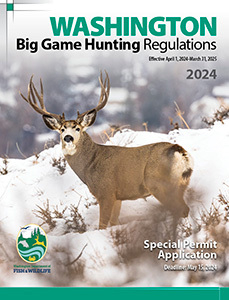Chronic Wasting Disease (CWD)
What is Chronic Wasting Disease (CWD)?
CWD is a fatal illness of cervids, which include white-tailed deer, black-tailed deer, mule deer, elk, moose, and caribou. CWD has not been detected in Washington but has been found in wild or captive cervids in most other states and Canada. An outbreak of CWD in Washington could severely impact our deer and elk populations, which could in turn impact hunting opportunities, economies that rely on hunting revenue, and ultimately ecosystem health and resilience.
How can you help?
To best maintain healthy cervid populations, we need help from our hunting community. Hunters can help contribute to cervid management and conservation by:
- Field dressing and leaving all inedible parts at the harvest-site or dispose of inedible parts at a landfill that will accept carcasses and parts.
- Getting your harvested deer or elk tested for CWD.
- Knowing carcass importation/transportation guidelines in states and provinces where you live and hunt.
- Limiting your baiting and feeding of wild cervids
- WDFW urges hunters that intend to use scents for cover and attractant to hunt deer and elk, to use artificial scents or scents that have been certified by the Responsible Hunting Scent Association (RHSA). Manufacturers that are enrolled in the RHSA use real-time quaking induced conversion (RT-QuIC) to ensure that no detectable levels of CWD are present in their products. These products can be identified by the DPP or RT-QuIC labels on them.
Learn more about the CWD Surveillance Program
If you harvest a deer or elk in eastern Washington within Region 1 and would like to have your deer or elk tested for CWD, please visit: www.wdfw.wa.gov/species-habitats/diseases/chronic-wasting/surveillance-program for information on how to submit a sample and for Hunter Check Stations locations.
Washington Carcass Transportation Restrictions
If you hunt deer, elk, moose, or caribou in states or provinces outside of Washington State, only the following items may be imported to Washington to reduce the risk of transmitting CWD:

Violation of this rule is a gross misdemeanor having a maximum penalty of a $5,000 fine or one year in jail. (RCW 77.15.290)
In addition, if you are notified by another state fish and wildlife agency that the animal you have harvested outside of Washington State has tested positive for CWD, you must notify the Washington Department of Fish and Wildlife within 24 hours. Violation of this rule is an infraction (RCW 77.15.160).
Get your animal tested and win!
WDFW’s staff collects CWD surveillance program collects samples year-round within Region 1 from adult (approximately one-year-old or older) deer and elk. WDFW will test any cervid statewide showing signs consistent with CWD. The Department has teamed up with the Washington Chapter of Backcountry Hunters & Anglers (BHA) to encourage hunters to have harvested deer and elk tested during the hunting season.
As an incentive, BHA helped to purchase 100 multi-season deer tags to be awarded via a random drawing for the 2025 season. Hunters who submit a CWD sample from an animal harvested in WDFW’s Eastern Region 1 will be entered into a random drawing for the 2025 tags. These tags are separate from the general multi-season deer tag drawing and will not affect the odds of drawing a general multi-season tag. The drawing will take place in April 2025, and winners will be notified by mail. For more information on CWD, visit www.wdfw.wa.gov/cwd.

